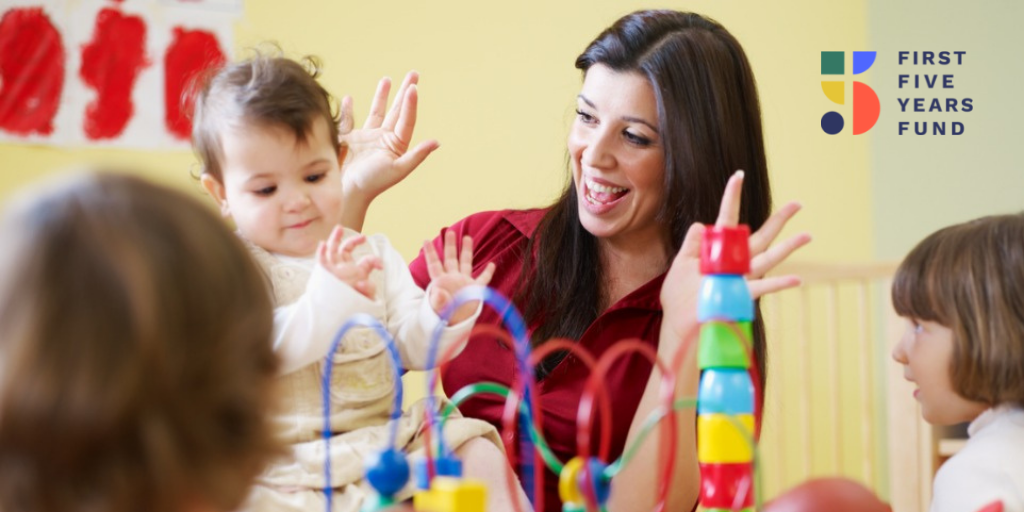How States Are Using PDG B-5 Systems Building Grants to Support Infants and Toddlers

The BUILD Initiative, ZERO TO THREE, and Start Early, recently released a new brief highlighting the strategies states are using to support infants and toddlers in their Preschool Development Grant Birth through Five (PDG B-5) Renewal applications. This brief highlights how PDG B-5 is being used to build the capacity of early care and education (ECE) systems, create infrastructure, provide direct services, and pilot new work. Their analysis found that states are employing different pilot programs and temporary strategies that are moving the needle in their states, but more federal funding is needed to ensure that they can see this work come to fruition and support young children and their families.
PDG B-5 is a competitive federal grant designed to improve states’ ECE systems. In 2023, 21 states were awarded Planning Grants, and 21 states were awarded Renewal Grants. While the scope of work for planning grantees is to conduct comprehensive needs assessments and draft strategic plans, the renewal grantees focus on implementing their strategic plan. The 21 renewal grantees are using this infusion of federal funding across a wide range of content areas in their ECE systems, and in a variety of ways, such as by implementing compensation reforms, expanding professional development training, building the supply of child care, and streamlining administrative requirements.
In analyzing PDG B-5 Renewal Grant applications, BUILD found that states have been charting their own course when it comes to ECE system development by working on a variety of projects and initiatives at once. They found that states tend to focus on shorter-term projects for their renewal grants, perhaps because states do not see PDG B-5 as a reliable, continuous funding stream and lack confidence that state funding would be available to sustain the work. States may also be focusing on producing near-term results, or the broad framework of the grant may have led to more responsive strategies.
According to BUILD’s analysis, PDG B-5 renewal plans were most likely to direct infant/toddler-focused dollars into five categories:
- Home visiting
- Infant and early childhood mental health (IECMH)
- Infant/toddler child care access
- Infant/toddler-focused professional development and coaching
- Systems to enhance access for families with infants and toddlers
Within these five areas, BUILD found that states are adopting 25 infant/toddler-focused strategies, such as piloting universal home visiting, expanding IECMH, offering grants/stipends to programs, establishing or enhancing coaching strategies, and establishing coordinated intake and referral systems, among many others. Between birth and age three, children’s brains form more than one million neural connections each second, laying the foundation for success in school and beyond. At a time when brain development is happening at a rapid pace, fostering a safe and high-quality learning environment is critical. However, the cost of child care is more expensive for infants and toddlers, and it is harder to find than care for preschool-age children. Additionally, despite specialized knowledge and competencies required to care for young children, educators in infant and toddler classrooms are paid poverty-level wages and experience higher levels of turnover than educators providing care for older children. Taken together, infants and toddlers are a vulnerable population who are often left behind and PDG B-5 Renewal Grants provide an opportunity for states to create supportive, targeted strategies. Click here to read more about all of the strategies that states are pursuing and read on to see a few examples directly from BUILD of how states are using PDG B-5 renewal grant funds to improve their early childhood system for infants and toddlers.
Home Visiting
- Alaska plans to expand the typical delivery of home visiting services into other settings, including child care centers and homes and families with incarcerated parents, further supporting families that need it most but may not be able to receive services at home all the time. A pilot program in up to two communities will bring Parents as Teachers (PAT) home visitors and Infant Learning Program (ILP) providers (when applicable) into licensed child care facilities or homes to provide services. This will allow working families to access multiple supports with less stress while providing additional on-site assistance to the child care workforce at the same time.
Infant and Early Childhood Mental Health (IECMH)
- Idaho plans to build statewide capacity to support IECMH best practices via a partnership with AIM Early to support foundational IECMH training and hire trainers/coaches to conduct training for educators and families. Idaho also plans to develop a foundational IECMH training and hire trainers/coaches to conduct training for educators and families. The state will also increase the number of ECCE workforce members with the Association for Infant and Early Childhood Mental Health (AIM) endorsement by using PDG-R funds to cover both the costs of the endorsement and membership in AIM.
Infant/Toddler Child Care Access
- Delaware will offer contracts for infant/toddler seats in high-need areas of the state by expanding the state-funded preschool program to include infants and toddlers meeting specific eligibility requirements.
Infant/Toddler-Focused Professional Development and Coaching
- Mississippi will launch a pilot to expand the state’s coaching community consortium to include early learning professionals who work in any infant/toddler (IT) family- and center-based programs. Participants will have access to a Community of Practice and will receive notification of training dates, support materials, free CLASS observation reliability training, and leadership opportunities in ECCE trainings and conferences.
Systems to Enhance Access for Families with Infants and Toddlers
- New Mexico will establish a coordinated intake and referral system for home visiting and Early Intervention to improve coordination of services for families, to prioritize family needs and preferences, and to minimize duplication of services. The system will be user-friendly to encourage clinicians and other providers to make referrals to home visiting and early intervention.
While infant/toddler-focused activities are largely seeking to build and implement core elements for a sound infant/toddler system, they are providing temporary solutions in the absence of sweeping federal investments.
Throughout 2023, BUILD will continue to produce briefs highlighting how states are using PDG B-5 renewal grants, focusing on the following strategies: Child Care Access, Workforce Compensation, Systems Building through Governance Processes, Ensuring Access for All Children: Inclusion, Supporting Multilingual Learners, Career Pathways, Mixed Delivery Systems, and Financing.
This is part of a larger blog series, find the rest of our PDG series here.
Subscribe to FFYF First Look
Every morning, FFYF reports on the latest child care & early learning news from across the country. Subscribe and take 5 minutes to know what's happening in early childhood education.

